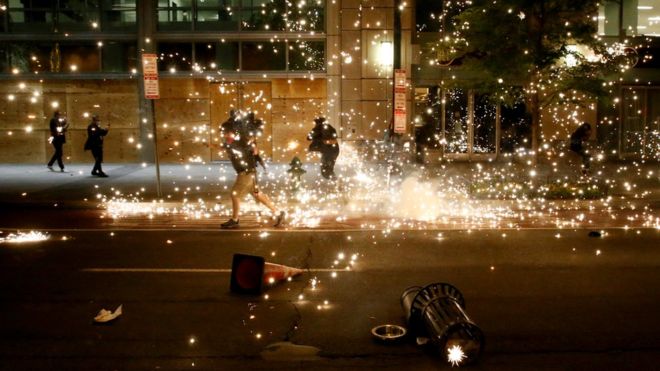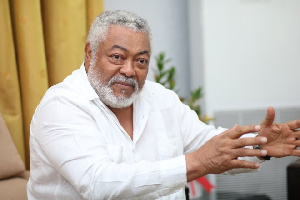WORLD NEWS
George Floyd: ‘Pandemic of racism’ led to his death, memorial told
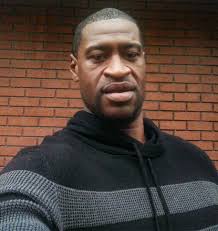
A lawyer for George Floyd has told a memorial service that a “pandemic of racism” led to his death.
Those gathered at Thursday’s tribute stood in silence for eight minutes, 46 seconds, the amount of time Floyd was alleged to be on the ground under the control of police in Minneapolis.
Hundreds attended the service, which also heard a eulogy from civil rights activist Rev Al Sharpton.
It was time to stand up and say “get your knee off our necks”, he said.
Mr Floyd’s killing, which was captured on video, has caused outrage and sparked a wave of protests in cities across the US.
Meanwhile, a few blocks away, three police officers charged with aiding and abetting Mr Floyd’s murder made their first appearance in court. Bail was set at $1m (£800,000) but would be lowered to $750,000 if they handed in any guns they owned and met other conditions, the judge said.
Derek Chauvin, the officer who continued to kneel on Mr Floyd’s neck as he pleaded that he could not breathe, has been charged with second-degree murder and is due to appear in court on Monday.
The vast majority of demonstrations over the past eight days have been peaceful, but some have descended into violence and rioting, with curfews imposed in a number of cities.
What happened at the memorial?
Addressing Thursday’s memorial service, lawyer Benjamin Crump said it was “not the coronavirus pandemic that killed George Floyd”.
“It was that other pandemic,” he said. “The pandemic of racism and discrimination.”
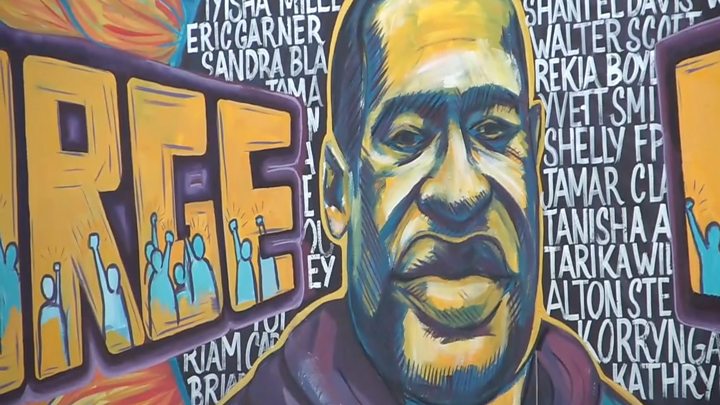
Members of Mr Floyd’s family, the Reverend Jesse Jackson, Minnesota Governor Tim Walz, Minnesota Senator Amy Klobuchar and Minneapolis Mayor Jacob Frey were among several hundred people at the service at North Central University in downtown Minneapolis.
Philonise Floyd, one of Mr Floyd’s brothers, described how the family had been poor when he and Mr Floyd were young and had washed their clothes in the sink and dried them in the oven.
“It’s crazy man, all these people came to see my brother, it’s amazing he touched so many hearts,” he said.
Reverend Al Sharpton meanwhile demanded accountability.
“We won’t stop,” he said, referring to protests that have taken place in every US state. “We’re going to keep going until we change the whole system of justice.”
In an emotional eulogy, he said Mr Floyd’s story had echoed that of black people in America.
“What happened to Floyd happens every day in this country, in education, in health services and in every area of American life. It’s time for us to stand up in George’s name and say: get your knee off our necks,” he said.
Further tributes will be held at Mr Floyd’s birthplace of North Carolina on Saturday, and in his hometown of Houston on Monday.
What other reaction has there been to the protests?
In his first video comments since Floyd’s death, former President Barack Obama said the demonstrations were as profound as anything he had seen in his lifetime, and called on Americans to seize the chance to deal with underlying problems in society.
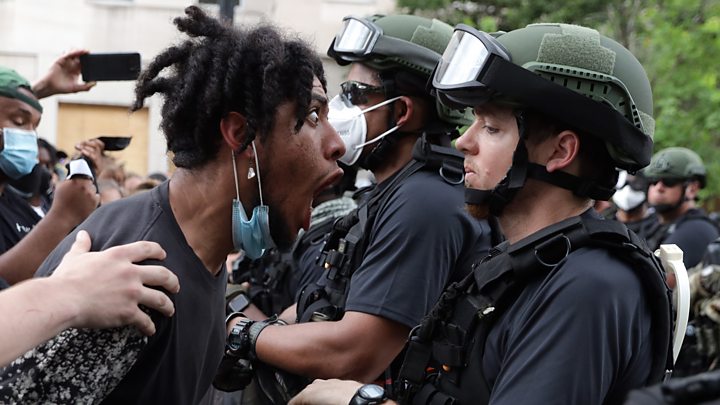
“Too often some of that violence has come from folks who were supposed to be serving and protecting you,” Mr Obama said.
“I want you to know that you matter. I want you to know that your lives matter, your dreams matter.”
The Duchess of Sussex, Meghan Markle, has also issued a personal message about Floyd’s death, saying his life mattered and recent events had been devastating.
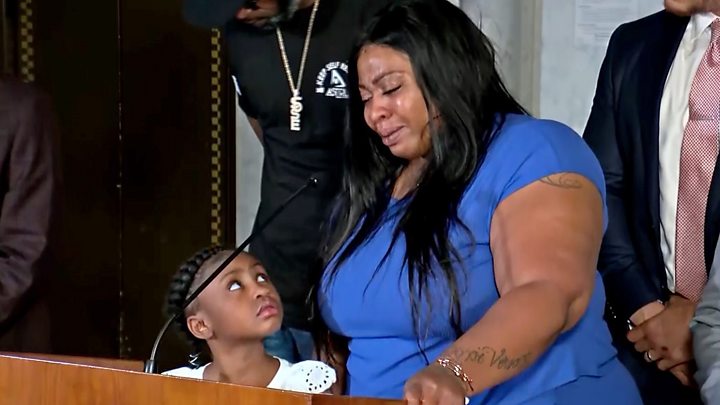
What happened to Floyd?
George Floyd, 46, was stopped by police investigating the purchase of cigarettes with counterfeit money on 25 May in Minneapolis.
A video showed Floyd being arrested and a white police officer continuing to kneel on his neck for several minutes even after he pleaded that he could not breathe.
Protests erupted and have continued since, across many US cities and also internationally, with rallies on Wednesday in Australia, France, the Netherlands and in the UK, where thousands gathered in central London.
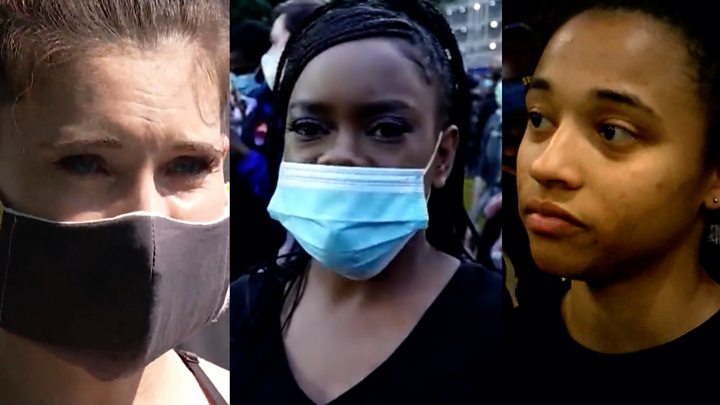
Floyd’s death follows the high-profile cases of Michael Brown in Ferguson, Missouri; Eric Garner in New York; and others that have driven the Black Lives Matter movement in recent years.
For many, the outrage over Floyd’s death also reflects years of frustration over socio-economic inequality and discrimination.
Protests over the death continued in dozens of cities on Wednesday night despite widespread curfews.
They have been largely peaceful, with cities such as Los Angeles and Chicago relaxing their restrictions amid hopes that the worst of the violence had passed.
A post-mortem examination has revealed that Floyd had the coronavirus in early April. But officials stressed that this played no role in his death.
BBC
-

 Lifestyle1 month ago
Lifestyle1 month agoRoad Safety Authority narrates how buttocks causes road accident
-

 GENERAL NEWS2 months ago
GENERAL NEWS2 months agoWhy 15 police officers stormed Owusu Bempah’s church – Kumchacha narrates
-
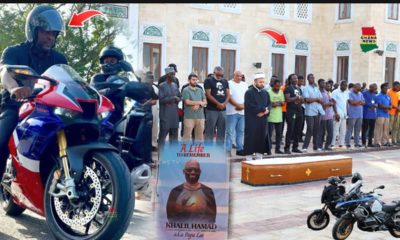
 GENERAL NEWS1 month ago
GENERAL NEWS1 month agoWatch how Ibrahim Mahama rode Honda superbike to pay last respects to late friend
-
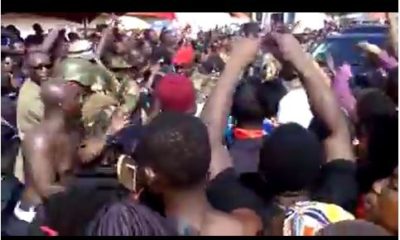
 GENERAL NEWS1 month ago
GENERAL NEWS1 month agoHow Offinso residents storm destooled queen mother’s house, demand for new chief
-

 South Africa News1 month ago
South Africa News1 month agoWoman thrown out of a speeding taxi while on her way to work
-
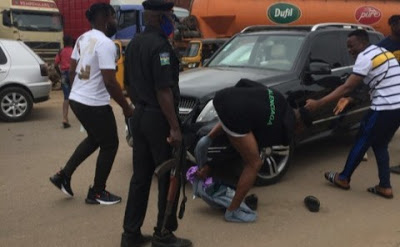
 GENERAL NEWS3 weeks ago
GENERAL NEWS3 weeks agoDeadly clash between youth and navy personnel results in two deaths at Tema Manhean
-

 SHOWBIZ KONKONSAH3 weeks ago
SHOWBIZ KONKONSAH3 weeks agoJunior Pope’s Death: Video of John Dumelo refusing to join canoe for movie shoot over safety concerns resurfaces
-
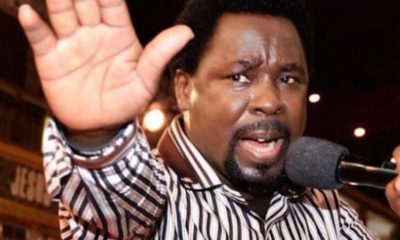
 News Africa2 months ago
News Africa2 months ago‘Satanically dubious’ – SCOAN releases statement on BBC’s report about TB Joshua, church



